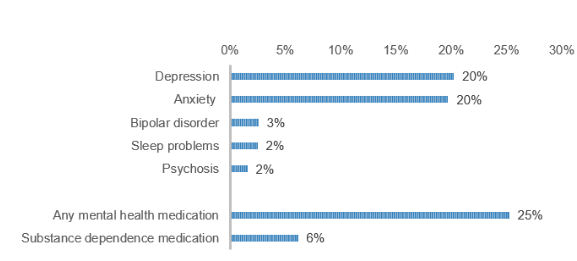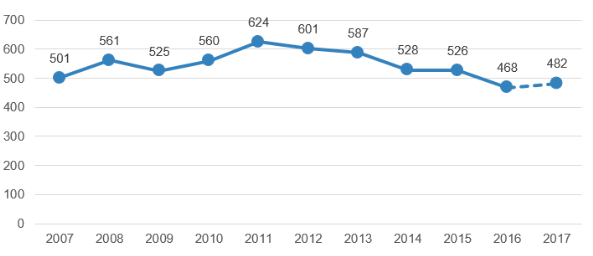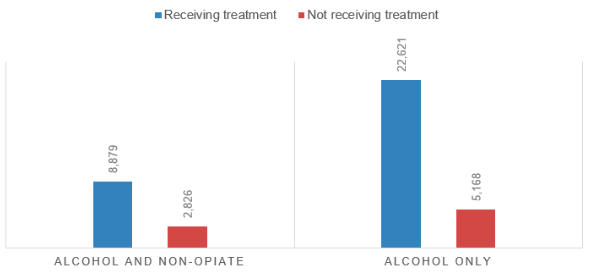Introduction
The nursing practices include the process of assessment, diagnosis, planning, intervention, and evaluation, which has been explained as the core and essence of nursing, central to all nursing actions. The nursing practices include different areas such as the promotion of health and wellness, prevention of illness, restoration of health and care of dying. Knowledge translation is the process in which high-quality knowledge is used in the decision-making process (Chapman, et al. 2020). Knowledge translation is essential in order to improve the practices in the healthcare sector. Along with the specialized nurses also play a vital role in the psychiatric alcohol and drug units while treating patients.
The present report includes a detailed plan of knowledge translation and discusses the role of nurses in the psychiatric alcohol and drug unit. The topic selected in this analysis is the need for specialized Psychiatric alcohol and Drug unit in ED department. Further, the report also described several stakeholders involved in the knowledge translation process through the implementation of practices could be possible. Other than this, the report included the development of a communication plan for nurses.
Role of the specialized Nurses in the psychiatric alcohol and drug unit as AOD nurses
Alcohol and drug addiction is a psychiatric disorder considered a serious issue and is a diagnosable illness that occurs in people who experience at least two of the 11 total criteria of this disorder. Hence it can be said that the consumption of alcohol and Drug can hinder the health structure of the human body and negatively affect the entire health system (Mallidou, et al. 2018). A person with alcohol and drug addiction can have severe symptoms which can affect the central nervous system. Over some time and due to poor lifestyles nowadays, the issue of psychiatric alcohol and Drugs has increased across the world and is a challenge for healthcare organizations.
People with this disordered have to face mental illness, which can lead to depression, anxiety, aggression, paranoia and other health issues. Hence it becomes very important to address the above problem in order to maintain good health outcomes across the world. In the context of healthcare organizations, due to the issue of psychiatric alcohol and Drug, they are required to have specialized nurses to take care of patients dealing with these issues. It has been identified that approx 35 million people suffer from drug use disorder while only 1 in 7 people receives proper treatment across the world (UnitedNations, 2022).
The adverse health consequences of drug use have become more severe and widespread than previously. In 2017 271 million people, or 55% of the entire global population aged 15-64, had used Drugs and alcohol. Hence this growing number forces the healthcare sector to improve its practices and focus on knowledge translation practices (UnitedNations, 2022).
Situational analysis
In the current situation, the issue of Psychiatric alcohol and Drug has become a severe issue for both the local community and the healthcare organizations. Hence it can be said that addiction to alcohol and Drug affects society and healthcare organizations adversely. In the UK, there are approx 589,000 people who are dependent on alcohol and suffering from mental health issues, majorly anxiety and depression.

Figure 1: People Suffering from Mental Health Issues due to Alcohol Consumption
(Source: Govt.UK, 2022)
Young people who are addicted to alcohol and Drug face academic difficulties and other health and family-related issues which affect the community and the entire society. Moreover, this issue can lead to various social issues such as drugged driving, violence, stress and child abuse which can lead to homelessness, crime and joblessness that highly affect the community and society. Other than this, it leads to additional healthcare costs and loss of future productivity, placing a burden on the community.
Further, to assess this issue, parental monitoring and supervision are highly required to reduce its negative impact on the community. Parents should be educated the information about Drug and alcohol addiction and its negative impact.
At the same time, the psychiatric alcohol and drug issue leads to various challenges for healthcare workers and raises demand for a more comprehensive health system within the organization. Nurses in every area of medical care experience unique and extraordinary professional challenges while treating patients with addiction recovery. Sometimes nurses become unable to handle the patients as people are addicted to alcohol and the Drug does not want to follow medication (Malla, Aylward and Ward, 2018). It becomes difficult for healthcare workers to convince patients to follow the prescription. As addiction to alcohol and Drug disturb the mental health of patients, they misbehave with healthcare workers, which lead to stress and aggressiveness in healthcare workers. Hence to assess this issue and deal with those patients’ healthcare organizations are required to appoint specialized nurses and provide additional training to existing staff.
Stakeholders and recipients
From public health and social care to health promotion and research, all healthcare organizations have four types of stakeholders such as patients, service providers, policymakers and payers (Wensing and Grol, 2019). In the case of psychiatric drug and alcohol situations, the primary key stakeholders are people who are addicted to drugs, healthcare organizations, government, community and professional bodies. Patients are the most important stakeholder in drug and alcohol issues across the world. In this to control and reduce the negative impact of Drugs and alcohol on health, patients should have an ethical responsibility to maintain their own health and control healthcare costs.
Healthcare organization and their workers also have an important role in psychiatric drug and alcohol issues as they treat people who are addicted to drugs. They are responsible for ensuring that patients receive adequate and quality services. The government also plays an important role as a stakeholder in the healthcare system related to drug and alcohol addiction. It is responsible for providing proper health facilities and hospitals and taking necessary steps to control this issue (Kalbarczyk, et al. 2021). The patients are the main recipients of the change in practices of the healthcare organization. Further, the government has taken some significant initiatives, which are the motivation behind the change in healthcare practices within the organization.
As now community is educated enough about the negative use of drugs and their impact on human health and expects healthcare organizations for better treatment. Thus this expectation of community and society is also being the motivation for change. Now days, healthcare organizations are focusing on aligning their medical leadership and management and making efforts to align with NHS improvement strategies to provide quality services. Hence staying aligned with NHS strategies will enhance the ability of the organization to bring changes in practices and improve the quality and efficiency of healthcare workers. Organizations provide specialized training to their employees so that employees become able to handle different types of patients (Dal Mas, et al. 2020). Specialized nurses will be handling to calm the patients who are addicted to Drugs and alcohol and help them to overcome this issue. With training sessions, healthcare professionals can be able for early interventions in patients with drug addiction and provide early intervention services to protect people from death.

Figure 2: Increasing Number of Death due to Alcohol and Drug Addiction
(Source: Govt.UK, 2022)
The above figure represents the growth in death due to mental illness, which causes by the high consumption of Drugs and alcohol in the UK. It indicates that about 542 deaths happen by suicide yearly; about 10% of total death in the UK are due to mental illness by misuse of Drugs and alcohol (Govt. UK, 2022).
KT facilitation team
The KT team has been assessed by providing specialized training required training to nurses and other team members to handle patients suffering from specific health issues. In order to reduce the issue of psychiatric drugs and alcohol, organizations hire specialized AOD nurses in order to facilitate quality services to Drug addicted patients. Each and every team member has previous experience working as an AOD nurse and gained knowledge of the consequences of drug addiction in patients (Gagnon, et al. 2018). The KT team has to include primary and secondary care settings while treating people with psychiatric Drugs and alcohol.
The job of AOD nurses is very challenging, and for this purpose, there are various skills that are required to be in the KT team to bring changes within the organization. The nurses should have basic care techniques and knowledge about how to assess patients suffering from psychiatric drugs and alcohol. Further, they are also required to have effective communication and understanding skills so they can carefully listen to and understand patients’ situations. They also require critical thinking skills to bring changes in the practices and resolve the issue of patients (Chapman, et al. 2020). Problem-solving and critical thinking is highly required in nurse as they have one on one time with patients and make decisions about their health.
AOD nurses work with patients suffering from mental health, depression and anxiety due to drug addiction, so being able to empathize is essential for nurses to provide quality patient care for knowledge translation within the organization. Hence it can be said that AOD nurses are required to have a number of skills and knowledge about their roles and responsibilities in dealing with Drug and alcohol-addicted patients.
KT strategies
As psychiatrists’ drug and alcohol issues have increased at a fast pace over the globe, healthcare organizations are required o adopt and implement knowledge translation strategies to stop this issue. The National Centre for Drug Abuse Prevention has provided some ways and guided healthcare organizations to follow strategies to prevent the population from drug and alcohol addiction. With the help of knowledge translation strategies, healthcare organizations foster a culture of hope and motivate individuals toward their life and achievements.
One of the effective strategies which can be adopted by healthcare organizations is to conduct Awareness Program and support people to overcome the issue. In this strategy, healthcare workers will educate people to know about their health and treatment. Further, the team members will also inform people about the negative impact of Drugs and alcohol and how they can ruin their life (Zhao, et al. 2021). Along with this Behavioral Change, the Support strategy is another knowledge translation strategy which is adopted by healthcare workers. With the help of this knowledge translation, strategy healthcare organizations will focus on the adoption or promotion of health and treatment behavior at an individual level. This strategy helps individuals to bring change in their behavior and encourage stopping the consumption of Drug and alcohol.

Figure 3: Number of People Receives Treatment for Alcohol Addiction
(Source: Govt.UK, 2022)
The above figure represents the number of people receiving treatment for alcohol addiction in the UK. It indicates that 72000, which mean approx 55% of people in the UK, have taken treatment due to poor mental health in the last year.
The skills and Competence Development strategy is also used as a knowledge translation strategy in healthcare in order to remove the issue of drug and alcohol addiction. Under this strategy, healthcare organizations provide specialized training sessions so that they can understand the condition of patients and support them in overcoming it.
A holistic Community Based Service strategy is also implemented by healthcare organizations to help and support people throughout the recovery process. Under this strategy, healthcare workers identify the root cause of the overconsumption of Drugs and alcohol in individuals (Eljiz, et al. 2020). Further, they create counseling sessions for them and motivate them to de-addiction provide aftercare along with this healthcare workers’ rehabilitation for the entire person recovery process of addicts.
Hence these are the main strategies used by healthcare organizations as knowledge translation strategies. In order to measure the effectiveness of strategies, healthcare workers analyze the improvement and reduction in the consumption of Drugs and alcohol.
Communication plan
A communication plan is a policy-driven approach to providing stakeholders with information. The plan formally defines who should be given specific information by what type of communication channel will be used to communicate the information (Kitson, et al. 2018). In context with the healthcare sector, the communication plan is a collection of procedures, policies and technology used to improve the care team’s performance.
| Strategy | Communication channels | Description |
| Awareness program | The awareness program will be run through the seminar, meetings and different events with public speaking to make people aware of the current issue of Drug and alcohol addiction and its negative impact. | This strategy or activity will help people to gain knowledge about the issue and its consequences. Along with this, it will motivate people to stop their consumption of Drugs and alcohol and make parents aware of monitoring their children’s activities. |
| Behaviour change support | This strategy will be communicated by providing support and meeting patients and understanding their condition with emotions. Other than this, the physical documents will also be provided to patients to understand the impact of Drugs and alcohol on their health and motivate them to change their behavior and beliefs. | Personal meetings and counseling of patients help patients and build emotional support between patients and healthcare workers. Emotional support can build strong dedication in patients and inspire them to change their habits (Gagnon, 2022). |
| Skill and development training | The training will be provided to healthcare workers through videos and sessions. It will help employees to gain deep knowledge about the issue and improve their work efficiency in handling and dealing with patients. The meeting will be conducted to provide training sessions and build interaction with workers who will help to transfer each other’s knowledge (Chan, et al. 2020). | Training and development programs are required to skill up employees’ productivity and work efficiency. With these training sessions, health care workers gain knowledge about the current consequences of the issue and help patients to reduce their consumption. |
Permission
In order to bring changes in a healthcare organization and implement knowledge translation, the permission of senior authority and management is required as; ultimately, they are responsible for bringing positive changes within the organization. The permission of the Board of Directors and Senior Managers of the organization is required as they will be responsible for any consequences, so it is necessary to take permission to align the changes in a positive way (Chandler, 2018). The board of directors and senior management play an important role in strategic decision-making that affects the organization’s performance and is responsible for maintaining quality and management.
Further permission to bring any changes in the organization’s practices is required to take from the Board of Directors and Senior Management to get proper guidance about the change process. The board of director team of the healthcare organization includes leaders, doctors, lawyers, nurses and government bodies which guide on what change is required to bring in operational practices and services of the organization (Bourbonnais and Michaud, 2018). Hence it can be said that to bring the changes in the desired manner, permission from the board of directors and senior management is required in healthcare.
Conclusion
Hence from the above analysis, it has been concluded that there are changes in healthcare practices required to improve the quality of services. On a global level nowadays, the consumption of Drugs and alcohol is rapidly increasing over time. It has been identified that healthcare organizations require hiring specialized nurses to handle patients with specific health issues, such as Drug and alcohol-addicted patients. Further, it has been determined that specialized nurses have different unique skills that help them to provide quality care and understand the patient’s situation. Other than this, most healthcare organizations adopt knowledge translation strategies in order to improve and bring changes in practices. The specialized nurses have a number of skills and experience in their field that helps to treat patients addicted to Drug and alcohol. Along with this, they are required to follow a communication plan in order to change the practices in an effective way.
References
Bourbonnais, A. and Michaud, C., 2018. Once upon a time: Storytelling as a knowledge translation strategy for qualitative researchers. Nursing Inquiry, 25(4), p.e12249.
Chan, T.M., Dzara, K., Dimeo, S.P., Bhalerao, A. and Maggio, L.A., 2020. Social media in knowledge translation and education for physicians and trainees: a scoping review. Perspectives on medical education, 9(1), pp.20-30.
Chandler, J., 2018. The Paradox of Intervening in Complex Adaptive Systems: Comment on” Using Complexity and Network Concepts to Inform Healthcare Knowledge Translation”. International Journal of Health Policy and Management, 7(6), p.569.
Chapman, E., Haby, M.M., Toma, T.S., De Bortoli, M.C., Illanes, E., Oliveros, M.J. and Barreto, J.O.M., 2020. Knowledge translation strategies for dissemination with a focus on healthcare recipients: an overview of systematic reviews. Implementation Science, 15(1), pp.1-14.
Chapman, E., Haby, M.M., Toma, T.S., De Bortoli, M.C., Illanes, E., Oliveros, M.J. and Barreto, J.O.M., 2020. Knowledge translation strategies for dissemination with a focus on healthcare recipients: an overview of systematic reviews. Implementation Science, 15(1), pp.1-14.
Dal Mas, F., Garcia-Perez, A., Sousa, M.J., da Costa, R.L. and Cobianchi, L., 2020. Knowledge translation in the healthcare sector. A structured literature review. Electronic Journal of Knowledge Management, 18(3), pp.pp198-211.
Eljiz, K., Greenfield, D., Hogden, A., Taylor, R., Siddiqui, N., Agaliotis, M. and Milosavljevic, M., 2020. Improving knowledge translation for increased engagement and impact in healthcare. BMJ open quality, 9(3), p.e000983.
Gagnon, M.P., 2022. Context Matters in Evidence Implementation Globally; Comment on “Stakeholder Perspectives of Attributes and Features of Context Relevant to Knowledge Translation in Health Settings: A Multi-Country Analysis”. International Journal of Health Policy and Management, 11(8), pp.1580-1583.
Gagnon, M.P., Attieh, R., Dunn, S., Grandes, G., Bully, P., Estabrooks, C.A., Légaré, F., Roch, G. and Ouimet, M., 2018. Development and content validation of a transcultural instrument to assess organizational readiness for knowledge translation in healthcare organizations: the OR4KT. International journal of health policy and management, 7(9), p.791.
Govt.UK, 2022. Increasing Number of Death due to Alcohol and Drug Addiction. [Online]. Accessed through: < https://ukhsa.blog.gov.uk/2020/11/17/alcohol-dependence-and-mental-health/ >. [Accessed on: 6th October 2022].
Govt.UK, 2022. Number of People Receives Treatment for Alcohol Addiction. [Online]. Accessed through: < https://ukhsa.blog.gov.uk/2020/11/17/alcohol-dependence-and-mental-health/ >. [Accessed on: 6th October 2022].
Govt.UK, 2022. People Suffering from Mental Health Issues due to Alcohol Consumption. [Online]. Accessed through: < https://ukhsa.blog.gov.uk/2020/11/17/alcohol-dependence-and-mental-health/ >. [Accessed on: 6th October 2022].
Kalbarczyk, A., Rodriguez, D.C., Mahendradhata, Y., Sarker, M., Seme, A., Majumdar, P., Akinyemi, O.O., Kayembe, P. and Alonge, O.O., 2021. Barriers and facilitators to knowledge translation activities within academic institutions in low-and middle-income countries. Health policy and planning, 36(5), pp.728-739.
